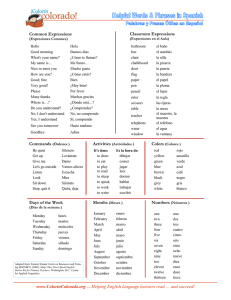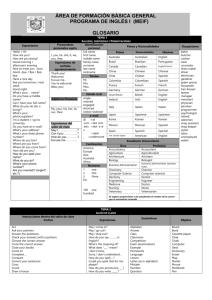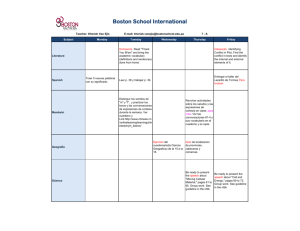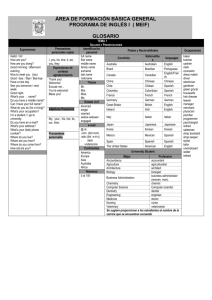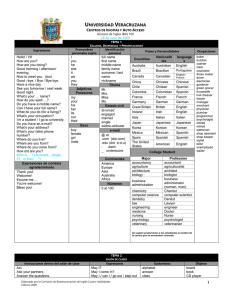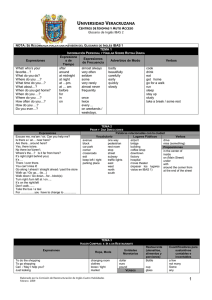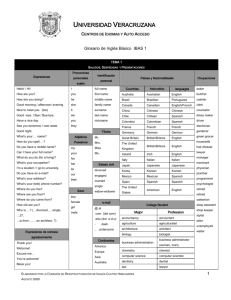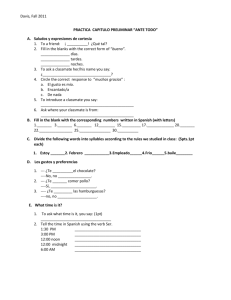ÁREA DE FORMACIÓN BÁSICA GENERAL PROGRAMA DE INGLÉS I (MEIF) GLOSARIO
advertisement
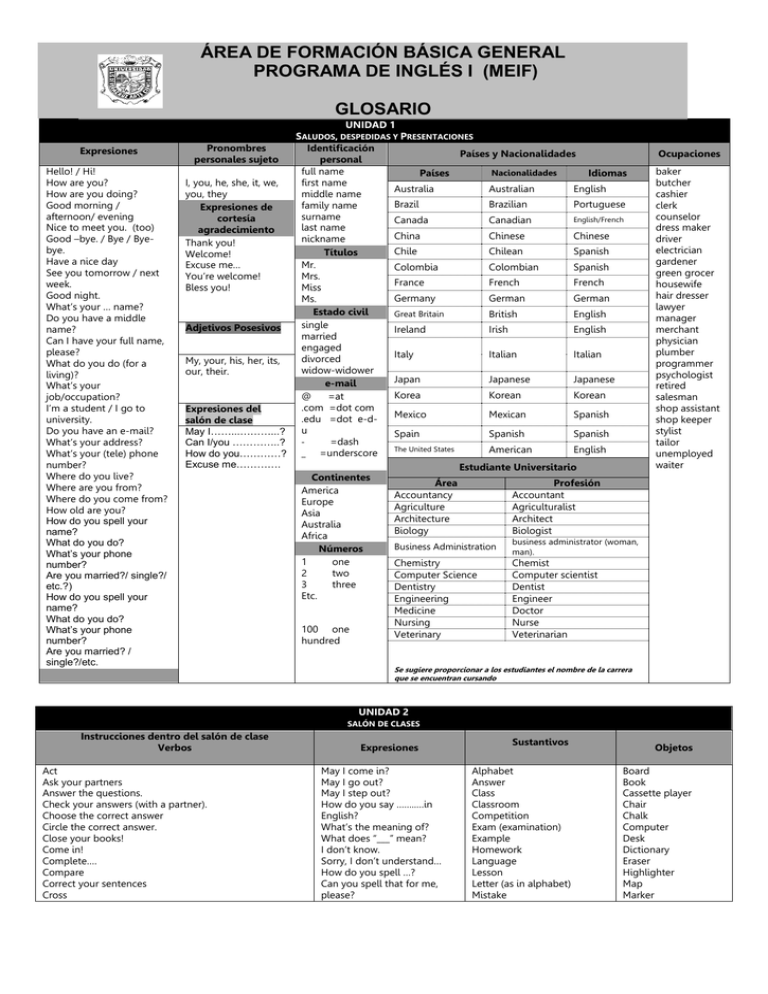
ÁREA DE FORMACIÓN BÁSICA GENERAL PROGRAMA DE INGLÉS I (MEIF) GLOSARIO Expresiones Hello! / Hi! How are you? How are you doing? Good morning / afternoon/ evening Nice to meet you. (too) Good –bye. / Bye / Byebye. Have a nice day See you tomorrow / next week. Good night. What’s your … name? Do you have a middle name? Can I have your full name, please? What do you do (for a living)? What’s your job/occupation? I’m a student / I go to university. Do you have an e-mail? What’s your address? What’s your (tele) phone number? Where do you live? Where are you from? Where do you come from? How old are you? How do you spell your name? What do you do? What’s your phone number? Are you married?/ single?/ etc.?) How do you spell your name? What do you do? What’s your phone number? Are you married? / single?/etc. Pronombres personales sujeto I, you, he, she, it, we, you, they Expresiones de cortesía agradecimiento Thank you! Welcome! Excuse me… You’re welcome! Bless you! Adjetivos Posesivos My, your, his, her, its, our, their. Expresiones del salón de clase May I……...………...? Can I/you …………..? How do you…………? Excuse me…………. UNIDAD 1 SALUDOS, DESPEDIDAS Y PRESENTACIONES Identificación Países y Nacionalidades personal full name Nacionalidades Países Idiomas first name Australia Australian English middle name Brazil Brazilian Portuguese family name surname English/French Canada Canadian last name China Chinese Chinese nickname Chile Chilean Spanish Títulos Mr. Colombia Colombian Spanish Mrs. France French French Miss Germany German German Ms. Estado civil Great Britain British English single Ireland Irish English married engaged Italy Italian Italian divorced widow-widower Japan Japanese Japanese e-mail @ =at .com =dot com .edu =dot e-du =dash _ =underscore Continentes America Europe Asia Australia Africa Números 1 one 2 two 3 three Etc. 100 one hundred Korea Korean Korean Mexico Mexican Spanish Spain Spanish Spanish The United States American English Estudiante Universitario Área Accountancy Agriculture Architecture Biology Profesión Accountant Agriculturalist Architect Biologist Business Administration business administrator (woman, man). Chemistry Computer Science Dentistry Engineering Medicine Nursing Veterinary Chemist Computer scientist Dentist Engineer Doctor Nurse Veterinarian Ocupaciones baker butcher cashier clerk counselor dress maker driver electrician gardener green grocer housewife hair dresser lawyer manager merchant physician plumber programmer psychologist retired salesman shop assistant shop keeper stylist tailor unemployed waiter Se sugiere proporcionar a los estudiantes el nombre de la carrera que se encuentran cursando UNIDAD 2 SALÓN DE CLASES Instrucciones dentro del salón de clase Verbos Act Ask your partners Answer the questions. Check your answers (with a partner). Choose the correct answer Circle the correct answer. Close your books! Come in! Complete…. Compare Correct your sentences Cross Expresiones May I come in? May I go out? May I step out? How do you say ……..…in English? What’s the meaning of? What does “___” mean? I don’t know. Sorry, I don’t understand… How do you spell …? Can you spell that for me, please? Sustantivos Alphabet Answer Class Classroom Competition Exam (examination) Example Homework Language Lesson Letter (as in alphabet) Mistake Objetos Board Book Cassette player Chair Chalk Computer Desk Dictionary Eraser Highlighter Map Marker Count Draw Find Know (don’t know) Learn by heart Listen to … Look at page 108… Match the columns. Number the sentences. Open your books… Practice with a partner. Raise your hand. Read the instructions… Repeat Say hello! Unscramble… Sit down! Speak louder / slowly, please! Speak up please¡ Stand up! Spell Turn to page … Translate Underline the correct answer. Understand (do you understand?) Work by yourself. Work in groups. Work in pairs. Write your name on your notebook How do you pronounce ___? How do you write _____? Please, speak slowly. Can you repeat, please? Say it again, please Again please. I have a question I didn’t do homework Can you lend me __, please? What’s this? What’s that? What are these? What are those? Right! This is… That is … These are … Those are … Correct That’s right That’s wrong Wrong Number Question School Sentence Test Text Tick University word Mouse Notebook Pen Pencil Picture Piece of paper Table Wall Wastebasket Whiteboard Workbook UNIDAD 3 Descripción de Personas Expresiones Estatura What are /is … like? What does he/she look like? Who’s tall? Who’s that? How tall …? I’m twenty-one / I’m in my / his / her teens, in his/her twenties I’m/He/she is 1 .55 meters tall I weigh 70 kilos. A woman / man with blue eyes She has blue eyes. Her eyes are blue. What do you wear…? kind of … medium / average height short tall very … Tipo de cuerpo athletic heavy muscular overweight slender / slim thin well-built Apariencia beautiful cute good looking handsome pretty ugly Edad elderly middle-aged, old young Tipo y estilo de cabello Bald curly long medium length short straight wavy Color del cabello blond brunette gray red white Otras palabras beard mustache pony tail Palabras para describir el carácter y la personalidad angry hardworking brave impatient calm independent careful intelligent careless jealous changeable moody clever outgoing dynamic patient enthusiastic punctual extroverted romantic friendly selfish funny shy generous spontaneous grumpy stubborn happy Conectores And, but, or Colores Ropa Accesorios Black blue brown gray green orange pink purple red violet white yellow light… dark… Color de ojos blue brown dark green hazel blouse coat, dress high heels jacket jeans pants raincoat sandals shirt , shoes skirt, suit sneakers socks sweater sweatshirt trousers T-shirt underwear tie , boots, pajamas, shorts, swimsuit, bathing suit uniform belt cap earrings glasses hat necklace sunglasses wallet watch Scarf ACTIVIDADES REALIZADAS AL MOMENTO Expresiones: Actividades Why are you studying English? What are/is … doing here? Where is he/ she coming cooking dinner / breakfast / lunch doing the laundry / the ironing / the vacuuming / the dishes reading a book / a magazine / a newspaper / an email sending an e-mail / a letter / a text message/ a fax / photos Expresiones adverbiales today now / right now at present from? Where are you going? Are you / is he having a good time? What’s happening here? Who are you talking to? Who are you eating with? What are you talking about? What are you reading? Expresiones What’s the weather like today? How is the weather in …? It’s . . . It’s awful / wonderful / terrible. It’s sunny but cold. driving a car / a truck Driving home / a car Eating breakfast / lunch / dinner going home / school / to work going to bed / the cinema / the theater/ the disco / the park / to work having breakfast/ lunch / dinner learning Spanish leaving a (voice) message / home listening to music / to the radio / the news making a cake / a phone call/ an appointment / a date / a mistake playing a sport / / video games / a musical instrument Días de la semana Estaciones del año Monday, Tuesday, Wednesday, Thursday, Friday, Saturday, Sunday spring summer fall/autumn winter Expresiones Excuse me,… Where’s the …..? Where are…..? Is there a …….? Are there …..? There is/are… Yes, there’s one on …. About… minutes Take a bus / a taxi. No problem! Yes, that’s right! Thanks (a lot)! sitting on the grass staying in a hotel / at home / in bed studying for an exam / English taking photos talking on the phone traveling by car / bus / train / plane / by bike / by motorcycle watching TV/ a movie wearing a uniform working in class /at the office/ at a school / in Cordoba writing a postcard / an article / a letter UNIDAD 4 DESCRIPCIÓN DEL CLIMA Palabras para Meses del año describir el clima January climate February cloud-cloudy March fog – foggy April hail May ice – icy June rain – rainy July storm – stormy August sun-sunny September snow – snowy October wind – windy November shine – shiny December at the moment Adjetivos para describir temperatura cold cool dry hot humid freezing warm wet UNIDAD 5 LOCALIZACIÓN DE LUGARES Lugares Públicos Expresiones de Lugar A friend’s house laundromat At aquarium library at 68 sun street / road bakery mall at number 15 bank museum On beauty parlor park on second avenue bus stop parking lot on the left / right book store pay phone on the corner (of) café pizza shop on the road center post office In or At Chinese/Italian/Mexican restroom in / at the mall restaurant restaurant in / at Mayo park Church school in / at the bus station Cathedral shoe store in the country cinema shopping mall at the bus station convenience store sports center on the corner of department store stationary store opposite doctor’s office subway station across from Drugstore supermarket around the corner from factory town hall gas station travel agency gym hotel internet café karaoke bar EL HOGAR, LOCALIZACIÓN DE OBJETOS Expresiones Casa What’s your favorite room? Why is it your favorite room? Do you live in a house or in an apartment? How many bedrooms are there? / does it have? Where is your office? It’s on the first floor. Partes de una casa o edificio attic basement bathroom bedroom closet dining room Números ordinales para dar fechas 1st first 2nd second 3rd third 4th fourth 5th fifth 6th sixth 7th seventh 8Th eighth 9th ninth 10th tenth 11th eleventh 12th twelfth Preposiciones On Monday On May …the In January Regiones y Áreas Geográficas Beach canal farm fields forest hill hometown island lake mountains river sea town village Preposiciones de lugar Mobiliario furniture armchair bed cabinet chair curtains dishwasher Palabras para describir una casa big comfortable favorite modern new nice behind beside between close to In Where do you work/ live? Where does he/she work/live? What’s this/that? What are these /those? Where is /are…? What’s…like? How many… are there? garage garden kitchen living room, room (swimming)pool toilet yard /patio balcony lift / elevator stairs floor hall roof upstairs downstairs Tipos de vivienda house flat or apartment dryer lamp loveseat microwave mirror refrigerator shower sink sofa stereo stove table television (TV) toilet tub washing machine oven DVD player Mailbox old pretty small Expresiones con AT at school at work at home at the office in front of near next to on Under UNIDAD 6 ACTIVIDADES DIARIAS Y HÁBITOS Expresiones What time do / does ...? How do / does …? Do / does ….? Where do / does ….? What do/does … have for ….? What’s for breakfast/lunch/dinner? When do /does ..? What do/ does … usually do on……? What do / does … do everyday? How do/ does … get to? By bus/ car/ train Take a taxi What time is it? It’s .. It’s … past … It’s … to … Actividades cotidianas arrive at school/work brush one’s hair brush one’s teeth catch the bus check your mail clean the house comb one’s hair do homework do the laundry do the housework drive to work/school finish work / school get dressed get to work go out for dinner go shopping go to bed go to school/work go to the gym go by bus / car go to the CAA Expresiones de tiempo y frecuencia hang out have breakfast/ lunch/ dinner leave home listen to music/to the radio make up play computer games read a book / a magazine / a newspaper relax start work / school take a shower take a bath take a nap take out the garbage take the bus / car / taxi wake up wash one’s face/hands wash the dishes watch TV Adverbios de frecuencia Always usually sometimes never AT at _____ o’clock. At night At midnight At noon At / on weekends / weekdays / the weekend IN In the morning In the afternoon In the evening Early on time late Frases adverbiales Once, twice (a month, a week, a year) Conectores de secuencia y contraste and, after that, but, before that, or, then. RELACIONES INTERPERSONALES Expresiones Do you have a big or a small family? How many people are there in your family? Do you have any children/ brothers or sisters? How many brothers and sisters do you have? How many children do you have? Do you have a pet? Are you / Is he/she married / single? What’s your sister’s name? My sister’s name is Nora What are your brothers’ names? My brothers’ names are ......and…….. PRONOMBRE POSESIVO “ ‘ S” Relaciones Familiares brother – sister child(ren) cousin father / mother grandchild(ren) grandfather-grandmother grandparents grandson-granddaughter husband / wife nephew – niece parents son - daughter uncle – aunt Familia política brother-in-law daughter-in-law father-in-law mother-in-law parents-in-law sister-in-law son-in-law Relaciones de trabajo, juego y otras boss classmate colleague coworker employee friend neighbor supervisor teacher teammate UNIDAD 7 HABILIDADES Expresiones What can you / he / she do? Yes, I can… / No, I can’t…. Can he/she sing? Yes, she can sing … No, she can’t sing … Can you sing / dance? Yes, I can do it well / Of course! Is it hard / easy? Adverbios de Modo very well, quite well, nicely, fast, badly, poorly, terribly. not at all / not well, etc. Expresiones Para Pedir Permiso, ayuda o un favor Can you please…? Could you please …? Excuse me… Can / Could / May I use…? Sure No problem / No, not now Sorry Can you turn on / turn off the…? Can you open / close the window? Can you do me a favor / help me?, hand me ? Can I leave / go out? Of course not Expresiones Don’t you like…? I like / love … but I don’t like… I really like + noun / object pronoun I really like + ing … I hate / dislike… + ing… I dislike .+ ing I prefer… It’s amazing/ fantastic / cool / terrible / boring / great / very pleasant Wow! No kidding! It’s / I’m / he’s free… In my free time Let’s buy some magazines / newspaper … What’s your favorite sport? What’s your favorite subject? Deportes golf ping-pong basketball baseball roller skating soccer softball skating swim tennis volleyball Diversas habilidades Deportivas dance do aerobics/yoga /tae-kwondo/karate lift weights / weightlifting play soccer ride a bike / horse run fast workout roller skate TEMA 8 GUSTOS Y PREFERENCIAS Entretenimiento Deportes Actividades recreativas y pasatiempos baseball basketball collecting comics bowling dancing boxing doing karaoke car racing doing yoga cycling drawing football eating in restaurants golf fishing hockey gardening horse racing going bowling jogging going clubbing playing ping-pong going for a walk roller skating going out running going shopping skating going to the gym soccer hanging out with friends softball having coffee with … surfing listening to music swimming playing video games tennis reading volleyball singing staying home sunbathing surfing the web taking photographs traveling watching movies watching TV Prácticas drive a car fix a car follow instructions play chess / billiards / pool/cards program a DVD player / a computer read a map speak another language surf the web use a computer Tipos de música classical country dance electronic hip hop jazz Latin pop rock salsa Tipos de libros biographies comics mysteries romances short stories science fiction Tipos de películas comedies horror love stories musicals mysteries science fiction thriller westerns Creativas broil cook design draw knit sweaters / blouses paint sew Medios impresos advertisement magazine newspaper picture Medios de entretenimiento CD player computer DVD iPods MP3 / MP4 radio television Pronombres de complemento directo e indirecto me, you, him, her, it, us, you, them Clases favoritas English, Administration, Science, Math. Se recomienda proporcionar a los estudiantes las materias que soliciten de acuerdo a sus necesidades UNIDAD 9 ALIMENTOS Y BEBIDAS Expresiones What is this/that? What are these/those? What’s your favorite…? What are your favorite…? What do you (usually) have for breakfast? Do you like…? I love … I like … I hate … I don’t like … Do you need any… Yes I need some.. Can I have…? I’ll have… Would you like…? I’d like… How much is it? Here you are. Alimentos apples bagels (pan de sal en forma de rosca) bananas beans beef bread butter bacon cake candy carrots cereal cheese chicken chocolate cookies eggs fast food fish french fries fruit hamburger ice-cream jam jelly junk food (chips, cheetos) mashed potatoes meat Mexican food muffins noodles omelet oranges pancakes pasta peaches pears pie pizza popcorn pork potato chips potatoes rice roast chicken salad salt sandwiches sea food shrimp soup spaghetti steak strawberries sugar sushi toast tomatoes vegetables yogurt Bebidas Comidas a drink beer bottled / mineral / tap / water coffee coke juice lemonade orangeade milk milkshake soda tea tequila wine food meals breakfast lunch dinner supper snack brunch Recipientes y porciones a bottle (of) a bowl (of) a can (of) a carton (of) a cup (of) a glass (of) a piece (of) a mug (of) a loaf (of) a slice / a piece (of) BIBLIOGRAFÍA Acevedo Ana, Harmer Jeremy y Lethaby Carol. Just Right 1 Student book 1. American Edition. Editorial Marshall Cavendish2007 Ascher Allen, Saslow Joan y Kisslinger y Ellen J. Top Notch Fundamentals Student’s book; Pearson Longman 2006 Beatty Ken y Nunan David. Expressions Intro Student’s book. Heinle and Heinle 2002 Blackwell Angela y Naber Therese. Know how Student’s Book Opener. Editorial Oxford. 2003 Clive Oxenden and Christina Latham-Koeng. American English File Student’s Book. Editorial Oxford.2008 Gaitan Sergio. The New Oxford Picture Dictionary. Oxford, 1999. Gray, E. and V. Evans: Welcome Plus 3 Pupil’s Book; Express Publishing. 2000. Healy Thomas y Wilson Ken. First Choice. Student’s Book Editorial Oxford. 2007 J.A. van EK and J.L. M. Trim. Waystage 1990. Cambridge University Press. 1998 H.Q. Mitchell: To the Top 2 workbook; MM publications, 2005. Norris Lucy y O. Tom (2007) Elevator 1, Student’s Book. Richmond Publishing.2007 Palabras y Frases del Inglés. Larousse. Sexta reimpresión.2002 Saslow, Joan, et al: Top Notch Fundamentals; Pearson Longman, 2005. Soars Liz and John. American Headway Starter Student’s Book; Oxford University Press. 2002 Soars Liz and John. American Headway 1 y 2. Student’s Book. Oxford University Press 2002.
